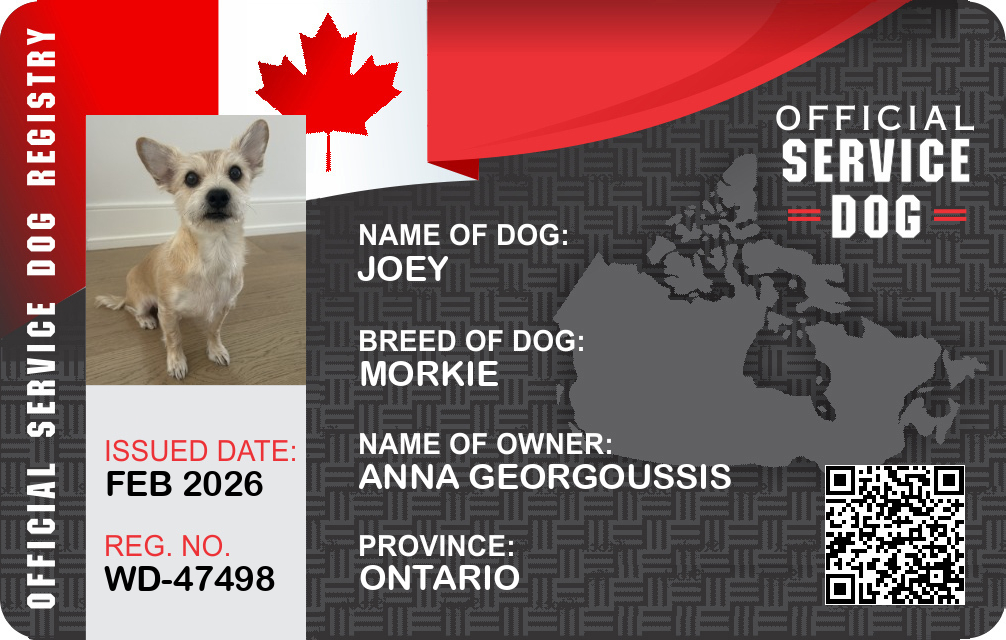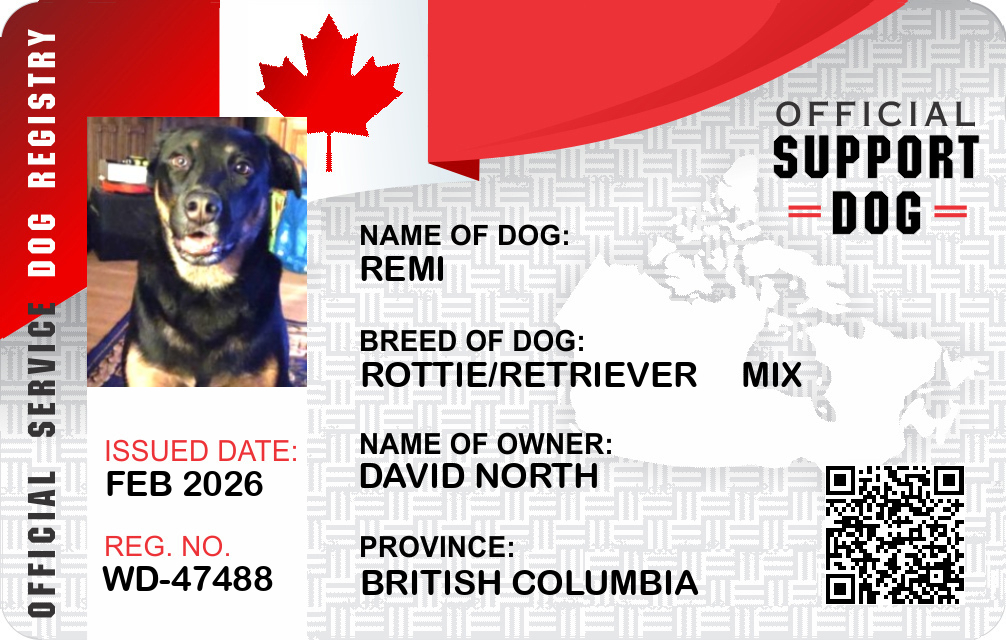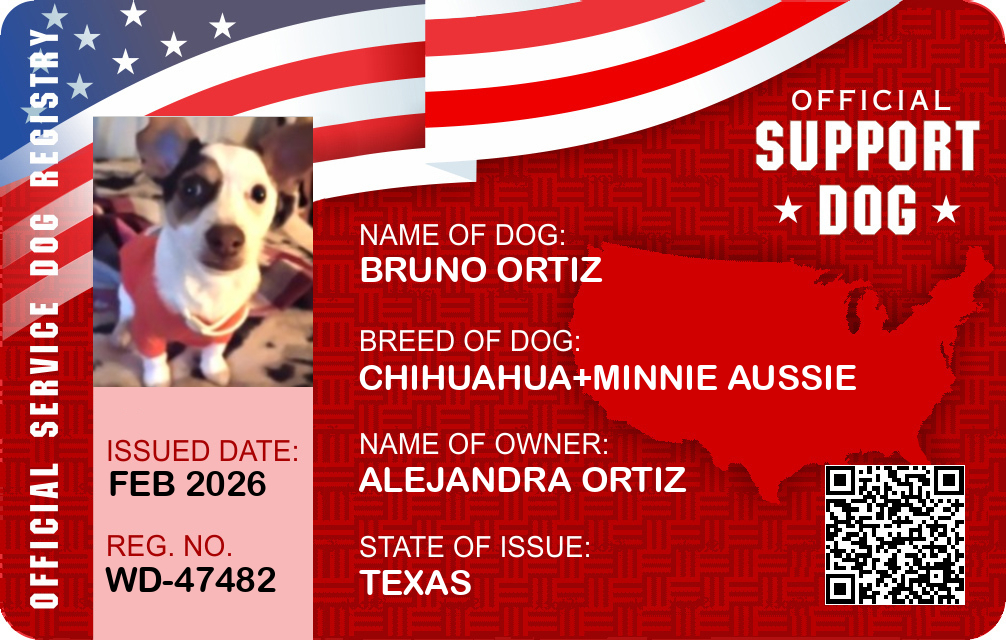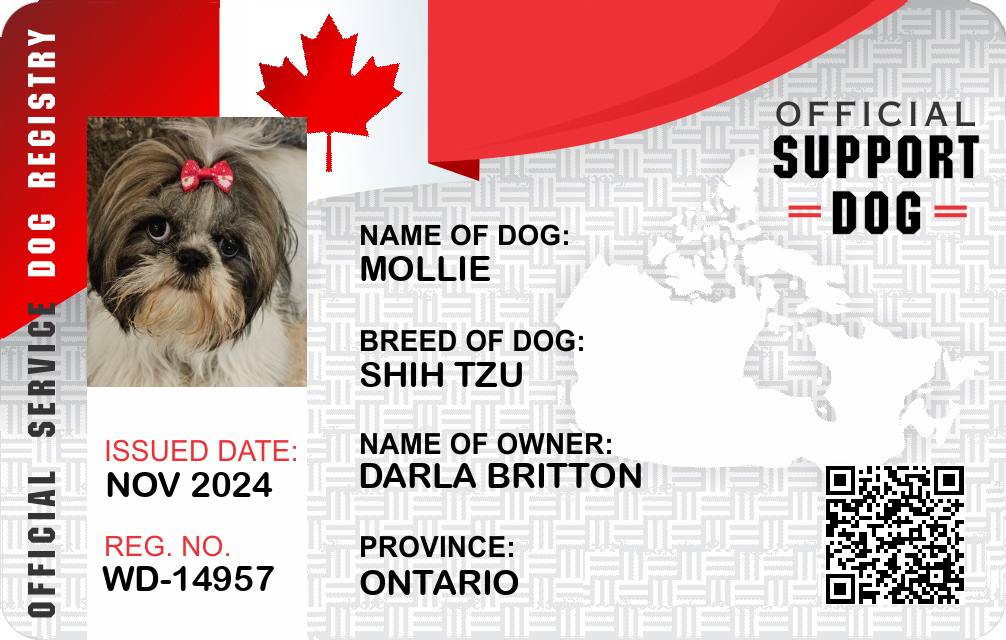Nevada Service Dog Laws
Get Your Documents
Example State Cards


Service dogs play a pivotal role in offering assistance and independence to individuals with disabilities. Recognizing and navigating the complex web of service dog laws, particularly in Nevada, is essential for handlers, businesses, and general members of the community. This guide aims to provide a comprehensive overview of the legal frameworks surrounding service dogs within the state of Nevada, as well as the interaction with federal laws.
Overview of Service Dog and Legal Definitions in Nevada
What is a Service Dog?
A service dog is defined under federal law, specifically the Americans with Disabilities Act (ADA), as a dog that is individually trained to perform tasks or do work for an individual with a disability. These tasks must be directly related to the individual’s disability, and examples include guiding individuals with visual impairments, alerting individuals with hearing impairments, and assisting during medical episodes. Nevada adopts a similar definition, ensuring consistency between state and federal regulations.
How Service Dogs Differ from Other Types of Assistance Animals
It is crucial to distinguish between service dogs and other assistance animals, like emotional support animals (ESA). Unlike service dogs, ESA provide comfort through their presence and do not require special training to perform tasks. Consequently, ESA and therapy animals do not have the same access rights as service dogs under the ADA and Nevada law. ESA are generally excluded from public accommodations but may have some protections in housing under different legislation like the Fair Housing Act (FHA).
Key Federal Laws Affecting Service Dogs (e.g., ADA, FHA, ACAA)
Three main federal laws influence the rights and accommodations of service dogs:
- Americans with Disabilities Act (ADA): Provides broad access rights to public accommodations, transportation, and government services for service dog handlers.
- Fair Housing Act (FHA): Covers housing situations, mandating reasonable accommodations for service dogs and, in many cases, emotional support animals, ensuring equal housing opportunities.
- Air Carrier Access Act (ACAA): Regulates the transport of service dogs by airlines, distinguishing between service dogs that perform tasks and solely emotional support animals.
By understanding these federal laws, one gains insight into how they lay the groundwork upon which Nevada has built its specific regulations.
State-Specific Service Dog Laws in Nevada
Nevada complies with federal statutes but also has its own legal nuances. The state’s regulations largely reinforce ADA provisions but may impose additional rules concerning the identification and treatment of service dogs. Nevada law currently aligns closely with ADA definitions and guidelines to ensure broad applicability and uniformity.
Housing Rights and Responsibilities
Under the Fair Housing Act, individuals with service dogs in Nevada receive protections ensuring that landlords make reasonable accommodations for service dog handlers. While landlords can ask for verification of the need for the animal in the case of untrained emotional support animals, service dogs are given broader access rights without requiring such documentation. Landlords in Nevada cannot charge additional fees or deposits for service dogs, although tenants remain liable for damages caused by the animal.
Public Access and Accommodation
Nevada law obligates public spaces to allow service dogs access alongside their handlers, reinforcing ADA mandates. Businesses cannot insist on identification, certification, or demonstration of the task the service dog performs. Instead, they may only make specific inquiries:
- Is the dog required due to a disability?
- What task or work has the dog been trained to perform?
There are no requirements for special identification, harnesses, or registry in Nevada, making it essential for business owners to understand and respect what is legally permissible.
Transportation and Travel Rules
The Air Carrier Access Act ensures that airlines accommodate service animals, including those associated with passengers with psychiatric service needs. While emotional support animals have fewer travel protections than they once did, trained service dogs maintain travel privileges under the ACAA. Nevada law does not impose separate transportation rules but supports these federal provisions, offering travel consistency across states.
Employment and Workplace Considerations
Within Nevada, the legal framework under the ADA extends to employment, wherein employers must provide reasonable accommodations, including permitting service dogs on premises unless doing so poses an undue hardship. Dialogue between employers and employees is central to determining an appropriate accommodation process, emphasizing the need for practical solutions.
Documentation, Requirements, and Processes in Nevada
Service Dog Documentation and Who Can Issue It
Unlike emotional support animals, service dogs typically do not require formal documentation. However, handlers might voluntarily use identification gear such as vests to minimize unnecessary inquiries. It is important to note that federal and Nevada law do not mandate this. Legitimate documentation or verification of disability needs, when required, is most appropriately provided by a healthcare professional, rather than a commercial service or registry.
Landlord, Business, and Provider Verification Rules
For business owners and landlords, Nevada law aligns with ADA restrictions on inquiries about service dogs. Verifications beyond asking if the animal is required due to a disability and understanding its function are inappropriate. Missteps in requesting additional documentation could expose a landlord or business owner to legal repercussions.
Rights, Limitations, and Legal Risks
Rights Service Dog Handlers Have in Nevada
Service dog handlers in Nevada enjoy comprehensive rights across housing, public accommodations, transportation, and employment. These rights facilitate equal access and non-discriminatory treatment, aligning closely with federal ADA regulations.
Limits on Service Dog Protections and Common Restrictions
While service dogs have significant protections, there are legitimate grounds for exclusion if a service dog exhibits disruptive behavior or poses a direct threat to health and safety. Nevada law, aligning with federal law, does not permit exclusions based solely on breed or size if the service dog otherwise meets behavior and training standards.
Penalties for Fraud or Misrepresentation
Nevada recognizes the potential for fraudulent misrepresentation of pets as service dogs, which undermines legitimate handlers and their rights. Falsely claiming a service dog for special access is subject to legal penalties, often involving fines, to discourage abuse of the system.
Practical Guidance for Service Dog Handlers in Nevada
How to Qualify for a Service Dog Legitimately
Qualification for having a service dog begins with having a recognized disability. Handlers should work with medical or psychological professionals to validate the need for a service dog and receive recommendations on appropriate service dog training programs for their specific needs.
How to Talk to Landlords, Airlines, and Employers
Handlers ought to communicate clearly, understanding their rights while navigating housing, travel, and employment situations. Having access to ADA resources or legal counsel ensures informed discussions regarding regulations and compliance.
Summary of Service Dog Laws in Nevada
The legal landscape for service dog handlers in Nevada is structured to align closely with federal ADA guidelines, ensuring widespread accessibility and non-discrimination, but also mandates specific compliance with local rules to strengthen these regulations. Handlers must remain informed, avoid mischaracterization of their dogs, and communicate adeptly with relevant parties to protect their and their service dog’s rights effectively.
In summary, here are key takeaways for service dog handlers in Nevada:
- Understand the exact legal definition of a service dog and federal-state law interactions.
- Recognize and exercise rights in housing, public spaces, travel, and employment.
- Know where and why limitations on service dog access apply.
- Ensure proper documentation and representation to avoid legal pitfalls.
- Remain vigilant against fraud to protect legitimate handler rights.
- Communicate effectively with landlords, employers, and public entities about rights.
- Utilize resources, like ADA guidelines and local advocacy groups, for support and information.
By focusing on these core points, service dog handlers in Nevada can navigate legal landscapes more confidently and effectively, ensuring compliance and protecting their essential rights.
Get Your Documents
Example State Cards













